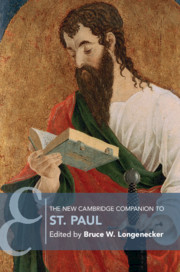Book contents
- The New Cambridge Companion to St. Paul
- Cambridge Companions to Religion
- The New Cambridge Companion to St. Paul
- Copyright page
- Dedication
- Contents
- Map
- Contributors
- Abbreviations
- Part I Paul, Letters and Communities
- Part II The Pauline Letter Collection
- Part III Paul’s Theological Discourse
- 9 What Did Paul Think Is Wrong in God’s World?
- 10 What Did Paul Think God Is Doing about What’s Wrong?
- 11 What Did Paul Think God Is Doing in Christian Communities?
- 12 How Did Paul Read Scripture?
- 13 Did Paul Abandon either Judaism or Monotheism?
- 14 Why Were People Attracted to Paul’s Good News?
- 15 How Was the Reception of Paul Shaped in the Early Church?
- 16 What Makes Paul Challenging Today?
- Bibliography
- Index of Biblical and Ancient Writings
- Index of Modern Scholars
- Cambridge Companions to Religion (continued from page iii)
- References
13 - Did Paul Abandon either Judaism or Monotheism?
from Part III - Paul’s Theological Discourse
Published online by Cambridge University Press: 19 June 2020
- The New Cambridge Companion to St. Paul
- Cambridge Companions to Religion
- The New Cambridge Companion to St. Paul
- Copyright page
- Dedication
- Contents
- Map
- Contributors
- Abbreviations
- Part I Paul, Letters and Communities
- Part II The Pauline Letter Collection
- Part III Paul’s Theological Discourse
- 9 What Did Paul Think Is Wrong in God’s World?
- 10 What Did Paul Think God Is Doing about What’s Wrong?
- 11 What Did Paul Think God Is Doing in Christian Communities?
- 12 How Did Paul Read Scripture?
- 13 Did Paul Abandon either Judaism or Monotheism?
- 14 Why Were People Attracted to Paul’s Good News?
- 15 How Was the Reception of Paul Shaped in the Early Church?
- 16 What Makes Paul Challenging Today?
- Bibliography
- Index of Biblical and Ancient Writings
- Index of Modern Scholars
- Cambridge Companions to Religion (continued from page iii)
- References
Summary
Pauline theology has often been defined in ostensible contrast to Judaism, especially Jewish monotheism and Jewish law observance. This essay reconsiders the evidence for this contrast, looking again at key Pauline texts and interrogating scholarly assumptions about Judaism and monotheism in antiquity.
Keywords
- Type
- Chapter
- Information
- The New Cambridge Companion to St. Paul , pp. 239 - 259Publisher: Cambridge University PressPrint publication year: 2020
References
Further Reading
- 2
- Cited by

